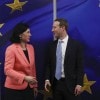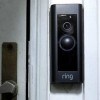Analysis | The Technology 202: Bernie Sanders draws criticism at Nevada debate for behavior of online supporters – The Washington Post

Senator Bernie Sanders, an Independent from Vermont and 2020 presidential candidate, is seen on television screens in the spin room during the Democratic presidential candidate debate in Las Vegas, Nevada. Photographer: Joe Buglewicz/Bloomberg
Ctrl + N
Bernie Sanders came under fire for his supporters’ online vitriol in a fiery exchange during last night’s contentious Democratic debate. It could signal future scrutiny of the Vermont senator’s unruly social media supporters as he surges in the polls.
The behavior of so-called “Bernie Bros” was under the microscope leading up to the caucuses after one of Nevada’s most prominent unions said its members were “viciously attacked” after criticizing Sanders’s Medicare-for-all plan, my colleague Isaac Stanley-Becker wrote last night. Sanders sought to distance himself from the online attacks.
“We have over 10.6 million people on Twitter, and 99.9 percent of them are decent human beings, are working people, are people who believe in justice, compassion and love,” Sanders said. “And if there are a few people who make ugly remarks, who attack trade union leaders, I disown those people. They are not part of our movement.”
Sanders’s notoriously loyal fan base has sparked criticism before among his Democratic rivals and could continue to be a sore point for the democratic socialist. Some have compared it to President Trump’s devoted digital following.
Pete Buttigieg, the former mayor of South Bend, Ind., raised concerns during the debate about whether Sanders could show the leadership needed to change today’s “toxic political environment.”
“I think you have to accept some responsibility and ask yourself what it is about your campaign in particular that seems to be motivating this behavior more than others, because in order to turn the page on the Trump era, we’re going to need a president, not just a candidate who can win, but a president who can move us forward,” Buttigieg said.
Sanders himself has not used Twitter as aggressively as Trump to engage in personal attacks on his opponents, and last night’s disavowal of bad online behavior in his name stands in stark contrast to the president’s embrace of some of his most controversial social media supporters. Trump has retweeted their attacks or memes, and he even invited many of them to a White House event last year.
But Sanders has faced long-running criticism that his digital supporters propagate misogynistic and other vicious online attacks, dating back to the 2016 election. It’s so well-known that it’s even become a punchline on “Saturday Night Live.” During a recent episode, actor Larry David did an impression of Sanders joking he was “king” of an army of Internet trolls .
No other Democratic candidate’s supporters are as engaged in such behavior to an equivalent extent. Buttigieg, the former South Bend, Ind., mayor, called on Sanders to reflect on why this pattern arose.
Last night, Buttigieg called on Sanders to reflect on why his supporters behave as they do.
“Why is it especially the case among your supporters that this happens?” he asked.
Sanders pushed back, saying it wasn’t “especially” the case among his supporters and that women on his campaign also face ugly attacks. He also raised the possibility that Russia or other actors could be boosting the divisive behavior online, as Russian trolls did during the 2016 election.
“I’m not saying that’s happening, but it would not shock me,” Sanders said.
But as my colleague Tony Romm noted on Twitter, there’s no proof right now of that happening during this election cycle:
Sen. Amy Klobuchar (D-Minn.) – questionably – argued there was one way to prevent online sexism: “We could nominate a woman for candidate for president of the United States.”
Criticism of “Bernie Bros” isn’t likely to stop after the Nevada standoff. Before the debate, former New York mayor Michael Bloomberg, who has also been gaining in the polls, created an ad attacking Sanders on the issue. From his Twitter account:
There were few tech policy mentions during last night’s debate, but here were the other tech moments you might have missed.
- Buttigieg declared himself a “Microsoft Word guy,” responding to a jab from Sen. Elizabeth Warren (D-Mass.), who attacked his health-care plan as just a PowerPoint.
Charlie Warzel of the New York Times complained:
Other Twitter users debated what Microsoft program each candidate should identify with:
- Buttigieg took a swipe at Amazon for not paying federal income taxes in 2018, a recurrent criticism on the debate stage. (Amazon CEO Jeff Bezos owns The Washington Post. Here’s our explainer on why Democrats are attacking Amazon).
- Warren touted her plan to expand funding for diverse entrepreneurs. (Here’s our story from last year about what some diversity advocates in the tech industry thought of that plan).
BITS, NIBBLES AND BYTES

Hulu logo.(AP Photo/Dan Goodman, File)
BITS: Political groups have increasingly turned to Hulu, Roku and other-ad supported streaming to reach voters as more Americans cut cable, but federal ad transparency rules haven’t caught up, my colleague Tony reports. Campaign finance experts say the gap shows that lawmakers have made little progress in protecting users from potentially deceptive political advertising, even four years after Russian agents used social media to push political propaganda.
“I’m really worried people are going to be bombarded, and not going to have the information they need to assess all of what’s coming at them,” Meredith McGehee, the executive director of Issue One, which advocates for transparency in campaign spending, told Tony.
Like social media platforms, Hulu and streaming services attract advertisers by offering them precision ad targeting, which can microtarget users based on information such as gender, race and search history with much higher precision than traditional broadcast advertising. But while Facebook and YouTube have voluntarily established ad archives to combat some criticism of such targeting, Hulu maintains no such repository. Hulu declined comment for this story, and Roku did not respond.
The streaming ads have roiled both annoyed users and lawmakers, who say updates to federal transparency laws are overdue.
“At a time when our adversaries are using disinformation campaigns to undermine our democracy, we need to be pushing for more disclosure and transparency, not less,” Klobuchar, who has pushed for legislation to address the problem, said in a statement.

Attorney General William Barr . (AP Photo/Michael A. McCoy, File)
NIBBLES: U.S. Attorney General William P. Barr attacked large tech companies yesterday as he raised the possibility they could soon be held liable for a wide range of harmful content found on their website, my colleague Tony Romm reports. He said it might be time for the government to consider changes to Section 230 of the Communications Decency Act, which has long has spared tech companies from liability for content posted by their users.
“No longer are tech companies the underdog upstarts,” Barr said in a speech kicking off a day-long workshop on the law. “They have become titans.”
Yesterday’s event could just be the beginning of a lengthy battle.
“In raising a series of issues around Section 230, DOJ officials at one point asked if social media platforms should be held liable for decisions they make around political speech, according to two people with knowledge of the meeting who requested anonymity because it was supposed to be off-the-record,” Tony wrote. “That sparked into a heated debate among participants over allegations that social-media companies are biased against conservatives, a charge repeated by President Trump — yet one that Facebook, Google and other companies deny.”
A Justice Department aide initially described the battle over political bias as the “800-pound elephant in the room,” the sources told Tony.

Facebook CEO Mark Zuckerberg, right, is greeted by European Commissioner for Values and Transparency Vera Jourova prior to a meeting at EU headquarters in Brussels, Monday, Feb. 17, 2020. (AP Photo/Francisco Seco)
BYTES: European Union regulators released plans yesterday to rein in how tech companies use artificial intelligence, from facial recognition to self-driving cars. The legislative push signals they are becoming more aggressive about proactively reining in American and Chinese tech companies, Valentina Pop at the Wall Street Journal reports.
The legislation, which will be drafted by the end of the year, will also address concerns regarding American tech giants’ anticompetitive behavior and data sharing practices. Regulators want to subject data sets used to design machine learning technologies to human oversight as well as new disclosure requirements. The restrictions could force U.S and Chinese companies that don’t meet European rules to redesign their A.I. systems before using them in the region, Valentina reports.
“We recognize we missed the first battle, the battle of personal data,” EU Commissioner Thierry Breton said. “Europe has everything it takes to lead the ‘big data’ race, and preserve its technological sovereignty.”
Spokespeople for Amazon, Google and Facebook declined to comment on the proposals. EDiMA, an industry group representing big platforms including Google, Amazon and Facebook in Europe, welcomed the proposals as a “starting point,” it told Valentina.
PUBLIC CLOUD

Ring doorbell (Photo by Chip Somodevilla/Getty Images)
— Lawmakers want Amazon-owned Ring to provide a sweeping trove of documents about the extent to which the company partners with local law enforcement and how it shares user data with third-parties.
Rep. Raja Krishnamoorthi (D-Ill.), chairman of the House Oversight subcommittee on economic and consumer policy wrote in a letter to the company yesterday.
The letter cites reporting from The Washington Post, Gizmodo Vice and others that have dug into the extent of Ring’s police partnerships.
— University of California, Los Angeles will abandon its plans to pursue the use of facial recognition software technology, school administrators wrote in a letter to activist group Fight for the Future yesterday. Fight for the Future and student activists protested the school’s plans to adopt the technology as a part of nationwide campaign to urge college campuses to ban the surveillance technology.
— More news from the public sector:
World
The WikiLeaks founder wants to submit evidence that President Trump offered him a deal in 2017 through then-congressman Dana Rohrabacher, the lawyer told a British court. Rohrabacher said he “was not directed by Trump or anyone else connected with him to meet with Julian Assange.”
William Booth and Ellen Nakashima
Trump administration backs Oracle in Supreme Court battle against Google
The Trump administration is siding with software company Oracle over Google in the pivotal Supreme Court battle that has pitted the U.S. government against some of the top titans of the tech industry.
The Hill
PRIVATE CLOUD
— News from the private sector:
The Spooky, Loosely Regulated World of Online Therapy
There are no laws against a therapy app telling Facebook every time a person talks to their therapist, or sharing patients’ pseudo-anonymous feelings about suicide with an analytics company that helps clients measure how “addicted” users are to an app. But it is a particularly stark illustration of how limited medical privacy regulations are in the expanding world of online health.
Jezebel
“There is a general sense of fear, so people look out for information — and YouTube becomes one of the places to look for it.”
BuzzFeed News
Leaked Document Shows How Big Companies Buy Credit Card Data on Millions of Americans
Yodlee, America’s largest financial data broker, says the data it sells it is anonymous. A confidential document obtained by Motherboard shows people could be unmasked in the data.
Vice
FAST FWD
–Oracle workers are planning a walk-out today at noon to protest Oracle Founder and CTO Larry Ellison’s support of and fundraiser for Donald Trump. The protest is being organized by Oracle employees operating under the name “Employees for Ethics.”
— More news about tech workforce and culture:
Google faces a new investigation into whether it discriminated against a pregnant employee
Chelsey Glasson, a former user experience designer who worked at Alphabet’s Google for five years, alleged her supervisor made discriminatory remarks about pregnant women, retaliated against her with poor performance ratings and unfairly denied her a leadership position.
CNBC
Uber shuts downtown L.A. office, laying off about 80
With little warning, Uber notified about 80 customer support workers in its Downtown L.A. office that it was offshoring their jobs to an office in Manila.
The Los Angeles Times
Lime Has Slashed Pay Rates for Scooter Chargers So Much People Have Stopped Doing It
“At $3.30 you’re basically paying Lime for the privilege of charging their scooters for them,” one juicer commented on Reddit.
Vice
#TRENDING
— Tech news generating buzz around the Web:
How the Pink Princess and the Pink Congo Scam Flourished Online
The pink princess philodendron is the ultimate Instagram plant, with three-digit price tags to match. The following it cultivated was also ripe for deception.
Wired
In “deathfic,” writers of fan fiction find unexpected comfort in killing off their favorite popular characters.
The Atlantic
CHECK-INS
— Today:
- The House Communications and Technology Subcommittee will hold a field hearing on Thursday at 2 pm at the Prince George County Central Wellness Center on the importance of rural broadband access.
- U.S. Chief Technology Officer Michael Kratsios will join the Hudson Institute for a conversation on the future of American leadership in artificial intelligence and combating digital authoritarianism around the world today at 12 pm EST. A livestream will be available here.
— Coming up:
- Nava Public Benefit Corporation will host a conversation moderated by the Technology 202’s Cat Zakrewski on “Impact at Scale: From Big Tech to Civic Tech” at 6pm on March 10.
















